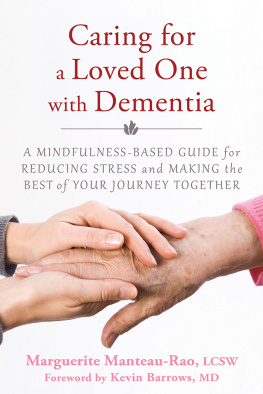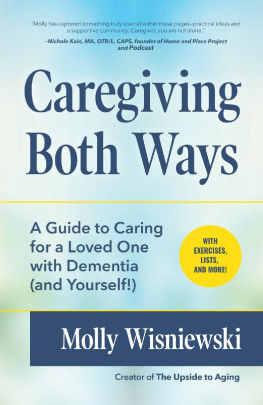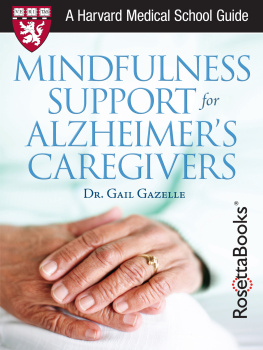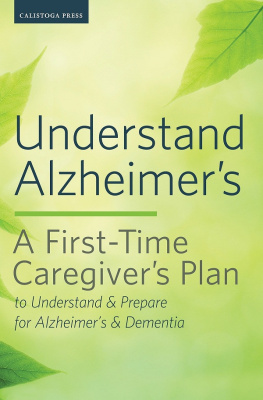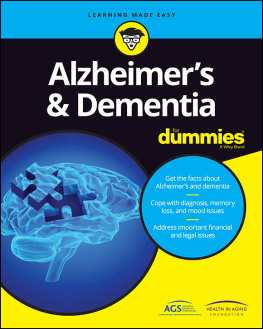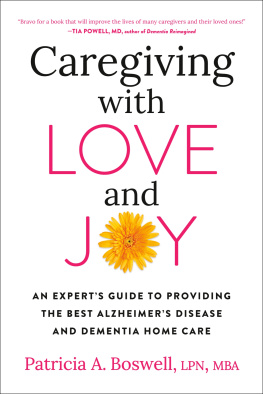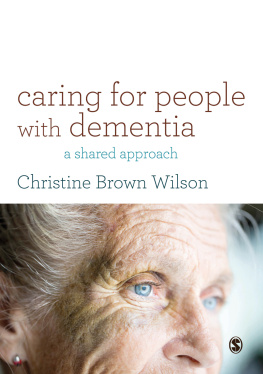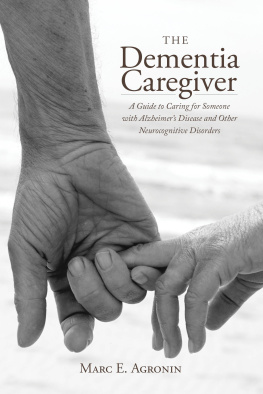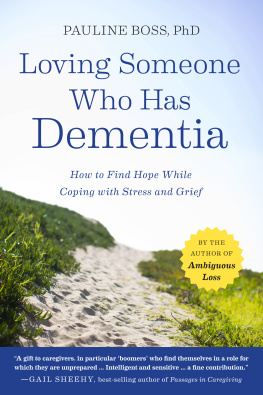
This book is an outstanding contribution to dementia care. Marguerites experience, understanding, and compassion shine through every page. She has done a stunning job of presenting the complexities of dementia and how to be a care partner with the support of a mindfulness approach. Organized and inspiring, anyone dealing with dementia will be immensely grateful for this book, surely destined to become a classic in the field.
Olivia Ames Hoblitzelle, author of Ten Thousand Joys and Ten Thousand Sorrows
I highly recommend this exquisitely crafted, inspiring guide brimming with practical wisdom that flows from the depths of the authors authentic mindfulness practice and insightful dementia care-partnering experiences. The skillful dementia care principles seamlessly interwoven with mindfulness practices offer readers an opening in the heart and mind for extraordinary possibilities through the power of caring presence. This is a must-read for all who envision and feel called to actualize a radical new way for being more fully present for ourselves, as well as for the person with dementia.
Maribeth Gallagher, DNP, FAAN, director of the dementia program at Hospice of the Valley in Scottsdale, AZ, mindfulness-based stress reduction (MBSR) practitioner and teacher, and mindfulness-based dementia care teacher
With this clear and compelling guide to mindfulness practices, Marguerite Manteau-Rao fills an important void in the education of those who support people living with dementia. It is only by learning to be fully present that supportive partners can transcend communication barriers, understand distress, and create a pathway for their own well-being as well.
G. Allen Power, MD, FACP, author of Dementia Beyond Drugs and Dementia Beyond Disease
Marguerite has designed a bridge for us to cross into a new era of understanding in dementia care where conscious caregiving and practices for cultivating awareness, compassion, and mindfulness are the new normal and standard of care. She beautifully illustrates the power of mindfulness practice to transmute caregiver confusion and dis-ease, which can be as challenging and debilitating as, if not more so than, dementia itself.
Laura E. Rice-Oeschger, LMSW, coordinator of the Dementia Wellness Initiative at Michigan Alzheimers Disease Center, University of Michigan Department of Neurology
Caring for a Loved One with Dementia offers new hope that todays dementia caregiver can find a sense of peace in the difficult journey of dementia caregiving. Manteau-Rao does a masterful job introducing mindfulness, a practice that will be new to most caregivers. Her book provides real-world examples of where mindfulness can make an impact, as well as concrete suggestions for practicing mindfulness regularly. Caregivers who incorporate her lessons into their life will enjoy long-lasting benefits not just for themselves, but also for their care recipient.
Angela Taylor, director of programs at Lewy Body Dementia Association
Marguerite has beautifully matched her own experience as a caregiver for a loved one with dementia with her mindfulness knowledge. The result is a book that meets the practical and emotional needs of family caregivers challenged by dementia. We dementia caregivers know all about stress, fatigue, grief, and sadness. This book opens us up to the possibility of moving beyond that by clearing our minds, opening our hearts, and partnering with our loved ones.
Robin Riddle, CEO of Brain Support Network, Parkinsons caregiver program facilitator at Stanford University, and primary caregiver for her late father with progressive supranuclear palsy
Marguerite Manteau-Raos mindfulness guide for caregivers helps outline the sweet spot between the practice of mindfulness and caring for a loved one with dementia.
Elizabeth Edgerly, PhD, chief program officer of the Alzheimers Association, Northern California and Northern Nevada Chapter
In this beautiful book, Marguerite applies her experience and compassion to gently guide a care partner as they learn to transform grief and loss into wisdom with loving-kindness. This book is the necessary platform for building a new perspective on changes we frequently face in the final phases of life. Each chapter provides another link in the lifeline that prevents drowning in our own thoughts and emotions.
Catherine Madison, MD, medical director at Ray Dolby Brain Health Center in San Francisco, CA
Marguerite Manteau-Rao has written an essential guide for caregivers supporting someone living with a dementia-related illness. A generous and skillful teacher, Marguerite shares practices that are beneficial and healing. Caring for a Loved One with Dementia is certain to help ease a seemingly impossible journey.
Roy Remer, director of the Guest House and volunteer programs at Zen Hospice Project in San Francisco, CA, and teacher of mindfulness practices for professional and informal caregivers
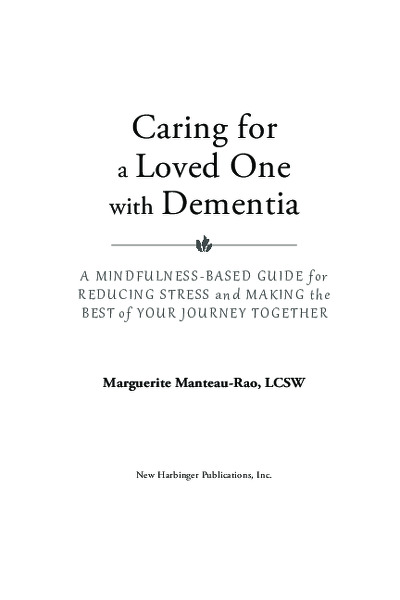
Publishers Note
This publication is designed to provide accurate and authoritative information in regard to the subject matter covered. It is sold with the understanding that the publisher is not engaged in rendering psychological, financial, legal, or other professional services. If expert assistance or counseling is needed, the services of a competent professional should be sought.
Informal Practice: Self-Compassion Break is adapted from the work of Kristin Neff.
Distributed in Canada by Raincoast Books
Copyright 2016 by Marguerite Manteau-RaoNew Harbinger Publications, Inc.5674 Shattuck AvenueOakland, CA 94609www.newharbinger.com
Cover design by Amy Shoup
Acquired by Melissa Valentine
Edited by Ken Knabb
All Rights Reserved
Library of Congress Cataloging-in-Publication Data
Names: Manteau-Rao, Marguerite, author.
Title: Caring for a loved one with dementia : a mindfulness-based guide for
reducing stress and making the best of your journey together / Marguerite
Manteau-Rao.
Description: Oakland, CA : New Harbinger Publications, Inc., 2016. | Includes
bibliographical references.
Identifiers: LCCN 2015039308| ISBN 9781626251571 (paperback) | ISBN
9781626251588 (pdf e-book) | ISBN 9781626251595 (epub)
Subjects: LCSH: Dementia--Patients--Care. | Dementia--Patients--Family
relationships. | Caregivers. | Stress management. | BISAC: FAMILY &
RELATIONSHIPS / Eldercare. | HEALTH & FITNESS / Diseases / Alzheimers &
Dementia. | BODY, MIND & SPIRIT / Meditation.
Classification: LCC RC521 .M365 2016 | DDC 616.8/3--dc23 LC record available at http://lccn.loc.gov/2015039308
To my mother, Mimi, whose journey through Alzheimers has inspired me to do this work.
Contents
Kevin Barrows, MD
Mindfulness is a way of paying attention. It is a fundamental capacity of our human minds. In one sense it is completely ordinary, but what it can reveal is actually extraordinary. Using mindfulness, it is possible to awaken to the mysteries, challenges, and miracles of this existence. And I find it deeply reassuring that we humans can bring our full attention to something, whether it be difficult and painful or easy and pleasurable, and see it clearly, know it, and relate skillfully with it. There is hope with whatever we encounter in this human life.
Mindfulness is particularly well suited to this present time and place. It is a remedy for the speed of our lives in the modern world, the tremendous amount of distractions, the information overload, and the profound existential questions we face. As we rush around accomplishing so many things, traveling so quickly, communicating with so many people, taking in so much information, is it any wonder that we might crave a moment to stop, be in our physical bodies, attend to one thing fully, and allow our minds to rest?
Next page
